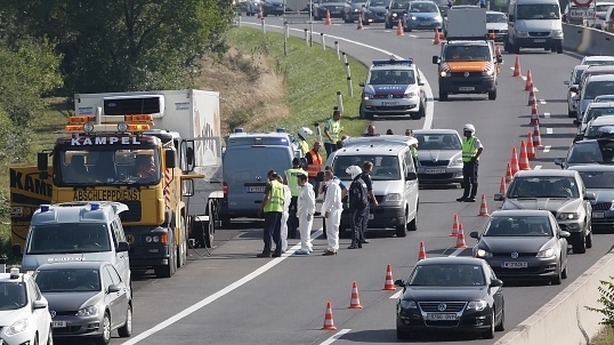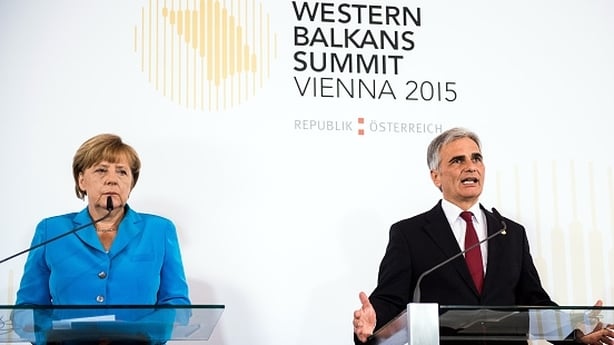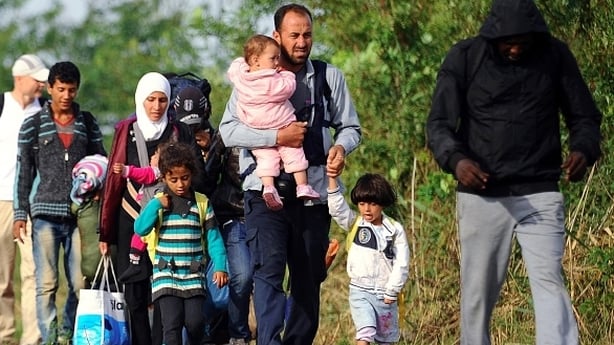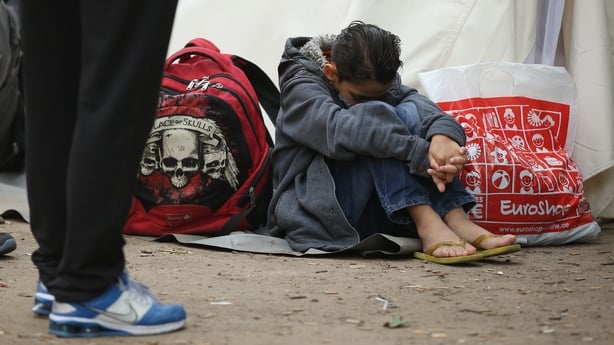Austrian Police have said it may take until tomorrow to count the number of bodies found in a parked lorry in eastern Austria near the Hungarian border today.
In a statement, the police said they expect there are more than 20 dead people in the lorry, but there may be as many as 50.
They added that there are indications the refugees were dead before the lorry entered Austria, with evidence the lorry was near Budapest yesterday.
The truck had Hungarian number plates, officials said.
The bodies were found after fluids were seen seeping from the back door of the 7.5 tonne lorry which had apparently been stopped on the A4 motorway since yesterday.
"One can maybe assume that the deaths occurred one-and-a-half to two days ago," Hans Peter Doskozil, police chief in the province of Burgenland, said, adding that "many things" indicated they were already dead when they crossed the border.
Helmut Marban, press officer for Burgenland police, said a highway patrol had spotted the lorry and at first thought it was damaged or had been in an accident.
"When they checked they found it had no driver and blood was dripping out of the vehicle and there was a smell of dead bodies," he said.
Hungarian Prime Minister Viktor Orban's chief of staff said a Romanian citizen had registered the number plate in the eastern Hungarian town of Kecskemet.

German Chancellor Angela Merkel has said the discovery of the dead refugees has shaken European leaders at a Balkans summit.
Chancellor Merkel told a news conference at the summit on the West Balkans in Vienna: "We are of course all shaken by the appalling news.



"This reminds us that we must tackle quickly the issue of immigration and in a European spirit - that means in a spirit of solidarity - and to find solutions."
Ms Merkel was also asked about resistance to mandatory quotas for the sharing of refugees across EU countries.
She said "Some countries do not take part in the asylum policy of the EU such as Denmark or Great Britain but those that do participate have a common obligation."
Thousands setting sail in hope of reaching Europe
Tens of thousands of people, mainly from Africa and the Middle East, have put to sea this year in the hope of reaching Europe, often dangerously packed into small vessels that were never designed to cross the Mediterranean.
Those who make it ashore and others travelling by land have increasingly tried to make their way north via the Balkans, causing tension among countries along the route.
Hungary plans to reinforce its southern border with helicopters, mounted police and dogs, and is also considering using the army as record numbers of migrants passed through coils of razor-wire into Europe.
Investigations were under way in Austria and Hungary after the bodies were discovered. The truck had Hungarian number plates, a Hungarian official said.
Austrian Interior Minister Johann Mikl-Leitner called it "a dark day" and underscored Vienna's demand that the European Union adopt a way to distribute a wave of refugees fairly so that they would not have to turn to human traffickers.
"This is a signal on the European level to act as quickly as possible here," she told the news conference, adding controls on international trains and border areas had been stepped up.
"It will certainly be a central task to protect our outer borders better," European Commissioner Johannes Hahn told the conference, reiterating that Brussels will propose within weeks a fresh look at the situation.
"We will have another go at quotas. I hope that in the light of the most recent developments now there is a readiness among all the 28 (member states) to agree on this," he said.
German Foreign Minister Frank-Walter Steinmeier, whose country expects 800,000 asylum seekers this year, said a fair distribution of refugees was needed to ensure support in countries taking in the bulk of migrants.
"That is why it is so important to make progress here. We need the same standards and processes, we need the commitment of all states to carry out early registration," he said.
His Austrian counterpart Sebastian Kurz said: "If we are not able to find a quick European solution here, then more and more countries like Hungary and Denmark, who are already doing it, will try to solve this crisis for themselves on their own within dividable measures and their own initiatives.
"It won't work and above all it threatens our European idea of having open borders and with that proper security at the EU's outer borders."
Serbian Foreign Minister Ivica Dacic put the onus on EU countries to find a better way to handle the influx of refugees.
"So you have a problem but you are asking us, Serbia, to come up with the action plan for migrants. You should come up with an action plan first and then ask us to come up with our plan," he told the conference.

